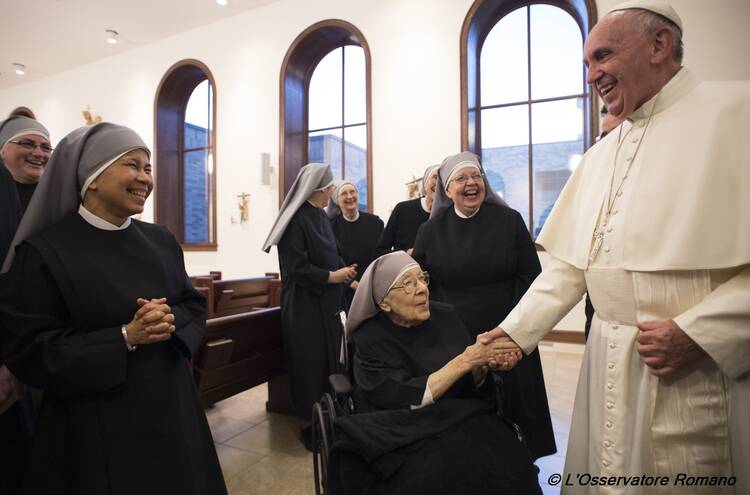On his Apostolic Journey to the United States, Pope Francis brought a message of encouragement. He called us to press on, always forward, to meet the issues of our day with energy, imagination and determination. The Holy Father also urged us to look back. He persistently reminded us of our heritage and of our duty to protect it. The American tradition of religious freedom gives individuals and institutions, families and communities, the space to seek and live the truth. Religious freedom is a “fundamental right,” a right belonging to all persons. Pope Francis gave a heartfelt affirmation of this tradition, calling it “one of America’s most precious possessions.”
In his words and actions, the pope expressed solidarity with those working to protect our precious heritage. At the White House, he gave support to his brothers, the U.S. bishops, who “have reminded us, all are called to be vigilant, precisely as good citizens, to preserve and defend that freedom from everything that would threaten or compromise it.” Following the Mass of Canonization of Junipero Serra, he visited the Little Sisters of the Poor to encourage them in their efforts to fight for the conscience rights of all people of faith who seek to serve others. Religious institutions and communities, like the Little Sisters, as well as Catholic Charities, USCCB Migration and Refugee Services, and many others exemplify “self-sacrifice in the service of the common good and compassion for those in need.” We are so grateful for the pope’s encouragement, as we seek to continue living out our faith in public.
In Philadelphia, Pope Francis reminded Americans of an easily overlooked aspect of religious freedom: it guards against uniformity and tyranny. He noted that “modern tyranny seek to suppress religious freedom… to try to reduce it to a subculture without right to a voice in the public square.” When the state attempts to override consciences, eliminate traditions and force people to conform to a single way of life, human dignity is severely degraded. As Pope Francis reminds us, “a healthy pluralism…respects differences and values them as such” (Evangelii Gaudium, 255), and we know from our history that the United States can be a country where a healthy pluralism thrives.
And on the flight home to Rome, when asked about whether or not people should be able to opt out of actions they see as morally objectionable, Pope Francis said, “Conscientious objection is a right that is a part of every human right…. Conscientious objection must enter into every juridical structure because it is…a human right.”
The Holy Father’s words, and the efforts of the United States bishops to preserve and defend religious freedom, should not be mistaken as political. Instead, they are motivated by a desire to serve the dignity and the common good of all men and women.
We Americans enjoy a beautiful heritage of religious freedom. Claiming that heritage today requires encounter and engagement between people who hold different viewpoints, so that we can grow to respect the right and duty of every person to live in accordance with her or his conscience. As Pope Francis said, “it is imperative that the followers of the various religious traditions join their voices in calling for peace, tolerance and respect for the dignity and the rights of others.” I hope that the Holy Father’s affirming words inspire such a dialogue, that we might draw from our heritage and resolve to protect our first, most cherished liberty.
Most Rev. William E. Lori is archbishop of Baltimore.








